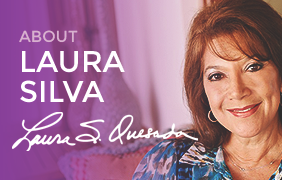Depression drains your energy and causes chemical changes in the brain that make it increasingly more difficult to feel optimistic and capable of overcoming a deep, dark funk. Unfortunately, the things that help the most, are also the things that are hardest to do – well, not the hardest to DO (once you’re doing them, you feel better); the hard part is motivating yourself to do them. Coming out of depression isn’t easy, but you can take control and take small steps that build on each other to create little windows of hope and joy, that will gradually lift your spirits enough for you to take more active measures. It takes time to feel better, but you can get there. One step at a time.
1. Start small. Set a few small “feel-better” daily goals
For example:
- a BRISK 15-minute walk
- a coffee date with a friend
- listening to your favorite upbeat music
- smiling at yourself in the mirror – even if you don’t feel like it, this is a proven mood lifter if you hold the smile for 2 minutes (aim for 5 of these every day!)
- Make an entry in a gratitude journal: name five things you are grateful for
Remember, the energy you put into taking small steps toward recovering from your depression will multiply quickly!
2. Cultivate supportive relationships.
Even reaching out to friends can seem impossible, but isolation makes things worse. Remember, depression is NOT something to be ashamed of. It’s a matter of brain chemistry, and you do need to lean on people as part of getting your brain chemistry back to normal. You are NOT weak because you are asking for help. You are STRONG because you do so. Share what you’re going through with people who are good listeners – these people won’t offer up advice; they will act as sounding boards so you can come to your own conclusions. Try to stay active socially, even if you don’t feel like it. Get dressed up (this helps boost mood too!); make an appearance, and if it becomes too much, leave early. But do make the effort especially if the invite involves happy and upbeat people!
3. To shift the focus off your woes: volunteer
Volunteering gives you a sense of purpose and it always feels great to be appreciated for the things you do!
4. Challenge your negative thinking
Depression affects the way you see everything, including yourself and your thoughts about the future. Forcing yourself to think happy thoughts won’t work. Instead, challenge your negative thoughts:
- If you routinely overgeneralize and make negative statements, either to yourself of to others, ask yourself if what you are saying is ALWAYS true. Or… not? Are you “always” stupid because you made ONE mistake? All-or-nothing thinking contributes to depression. Ask yourself if the future you fear is guaranteed to happen. Ask yourself if your negative perspective is the only way to look at a situation. For example, if someone fails to return your call, and you interpret it as “something is wrong with me” there is also another perspective, and that can be, “it has nothing to do with me; they are preoccupied and overwhelmed and super busy.”
- Let go of perfection. Impossibly high standards only cause depression when they aren’t attained. Instead, focus on doing your best. If you’ve done your best, be satisfied with it, no matter the outcome.
- Don’t focus on the negative events and results in your past while overlooking the positives. In fact, train yourself to see at least one positive aspect of every bad situation.
- Don’t jump to conclusions. Gather evidence, but don’t make negative interpretations unless you have evidence to support them. Remember, your way of perceiving things is not the only way!
- Don’t embody your negative emotions. Never say, “I am depressed” Instead, make these about feelings and experiences (which come and go!): “I feel depressed” or “I feel hopeless.”
- Don’t diminish the positive. For example “She said she had a great time at my party but I think she just said that because she’s my wife’s friend.” Just STOP at the positive and leave it at that!
- Don’t “should”’ yourself. Instead, encourage yourself lovingly with feelings: NOT “I should go for a walk, I know it makes me feel good.” But this: “I know it feels great to exercise so I’m going to make myself feel good by going for a brisk walk this afternoon.”
- Don’t label yourself. “I’m a loser” is a classic. Really? At everything? All the time? Your whole life? Challenge that notion
5. Take care of yourself!!
Even if, and especially when, you don’t feel like it.
- Dress nicely. Look put together even if you feel like you’re falling apart.
- Get at least 8 hours of sleep.
- Go out in the sunshine every day for a boost of serotonin (and combine that with the endorphins of exercise, for best results)
- Meditate, exercise or do yoga to manage stress
- Exercise regularly – aim for 30 minutes per day. If you can’t make yourself exercise, take the stairs instead of the elevator… walk your dog or the neighbor’s dog for 30 minutes. park as far from the store as you can… and walk while you’re making a phone call
- Eat foods that make you feel good; not the greasy, heavy things that put you in a food coma and make you nauseous; take advantage of Nature’s bounty! Avoid skipping meals, avoid caffeine, sugar, alcohol and refined carbohydrates to keep your mood and energy steady, boost your B-vitamins, seek out Omega-3 rich foods, add minerals such as magnesium and chromium, which help balance the system and eat these superfoods: bananas, spinach, blueberries, kale, apricots and oranges
6. Do what you love to do
Commit to spending at least 15 minutes every single day doing something that you love (or used to love). Push yourself to do this even if you don’t feel like it! It’s necessary to have “me time” every day and to give yourself something positive to look forward to.
7. Know when you’re at your limit and the above tips aren’t enough. Get help.
Depression can be treated, and it should be, so that you can regain your joy and zest for living. Professional counseling is a valuable resource! Remember – NO shame; it’s a matter of getting help re-balancing your brain chemistry. It’s science!
Better and Better,
Laura Silva Quesada
and the Team



 Laura Silva Quesada, daughter of Jose Silva – founder of the original Silva Mind Control Method, she was one of the primary research subjects, which gave her extensive personal experience and insight into the creation, and use of intuitive and life changing techniques.
Laura Silva Quesada, daughter of Jose Silva – founder of the original Silva Mind Control Method, she was one of the primary research subjects, which gave her extensive personal experience and insight into the creation, and use of intuitive and life changing techniques.


